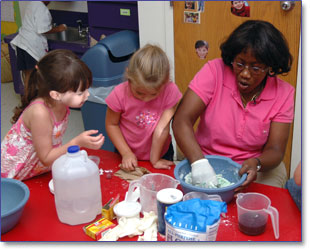  (Page 7 of 7) (Page 7 of 7)
Read
to Children to Promote Vocabulary
Reading aloud is a great way to increase a child’s
vocabulary. Books use many words that don’t
often occur in everyday conversation. How often
do you hear the word cupboard or cottage
or porridge outside of a book? Knowing
these words isn’t essential to communication,
but it raises a child’s awareness that
there are a lot of interesting words and a
lot of different ways to express an idea.
As you read aloud to children, you can select a few words from the story to teach. Three or four is plenty. Your goal is not to select the most unusual words but to select words that could be most useful to children. For example:
- Choose words that you, as an adult, would use but that are not yet part of your students’ vocabulary.
- Choose words so that children will understand
their definitions. For example, preschool
children know what it means to be happy and
they use the word "happy" in their conversations.
However,
"ecstatic" might be a new word for
the children in your class.
- Choose words that are useful and have meanings your students will understand.
- Choose words that will expand children’s
listening and speaking vocabularies, and which
will later contribute to their vocabularies
as readers.
Once
you have selected a few words, think of how you
can explain the meaning of each word in a way
your students will understand. Make it a “child-friendly” definition,
not a dictionary definition. You need
to define the word by using other familiar words
in the definition. Try to make your definition
into a sentence and use words like “someone,”
“something,“ or “describes”
as a part of your child-friendly definition.
For example, a child-friendly definition of "ecstatic"
might be “Ecstatic is when someone
is very happy.”
Classroom Arrangement: Play with Adult Mediation
Spaces,
as well as time and opportunity, are essential
to growing children’s language.
Try to create small spaces in the classroom that
have enough room for only three or four students.
Smaller spaces encourage children to engage in
longer and richer conversations with peers and
adults. Think about how this might also be true
for snack or meal time. Several tables that seat
four will encourage more conversation and turn-taking
than one long table.
In addition, daily center time is essential
to language growth. While children will carry
on conversations in every center in the classroom
when encouraged to do so, a dramatic play center
is particularly important to language growth.
Dramatic play centers that are theme-based,
with themes like a restaurant or flower shop,
encourage children to choose roles, create a
dialogue, and utilize narrative or story language.
It is also important that you spend time playing
with children in these centers. You can model
the kinds of conversations and vocabulary that
are appropriate to the play theme. You can use
the same language extension strategies mentioned
earlier - Comment and Wait, Ask, and Repeat
and Extend to enhance children’s
language use in the play centers. Remember to
sit and stay and play.

|